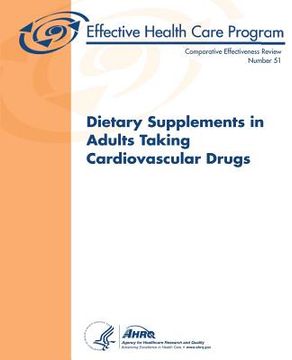Dietary Supplements in Adults Taking Cardiovascular Drugs: Comparative Effectiveness Review Number 51 (in English)
Synopsis "Dietary Supplements in Adults Taking Cardiovascular Drugs: Comparative Effectiveness Review Number 51 (in English)"
The American Heart Association estimates that more than 81 million American adults (one third of all adults) have at least one form of cardiovascular disease (CVD). CVD is broadly defined to include all the disorders of the arterial system, including the heart and coronary arteries, the arterial supply to the brain, and the peripheral arterial system. CVD manifests typically as hypertension, angina, myocardial infarction (MI), heart failure, stroke and transient ischemic attacks (TIAs), and intermittent claudication or blockage. While there has been progress in the control of CVD, it demands huge investments from the health care system, and represents great burdens and lost opportunities for individuals, families, and society overall. In addition to lifestyle and dietary recommendations, frontline treatment for prevention and treatment of CVD is primarily pharmaceutical, with patients requiring, on average, 6.3 concomitant prescription drugs from, on average, 5.9 different drug classes for primary and secondary prophylaxis of the disease itself and management of associated comorbidities. Complementary and alternative medicine (CAM) refers to preventive and therapeutic modalities not generally considered to be part of conventional medicine, including dietary supplements. Estimates suggest that approximately one-third to two-thirds of people suffering from heart failure or other cardiovascular disease use dietary supplementation and are thus placed at risk for potential adverse events from interactions with other pharmacologically active agents and nonadherence associated with polypharmacy. With compromised physiology due to aging, the elderly are most vulnerable to the adverse events of any drug interaction. On the other hand, addition of a dietary supplement to conventional cardiovascular drugs may confer benefit. Evidence of both benefits and harms of adding a supplement to cardiovascular drugs has been reported. Incorporation in clinical practice of knowledge regarding the impact of concomitant use of cardiovascular medications and dietary supplements requires access to reliable drug-supplement information, as well as physicians' commitment to documenting patients' supplement use. While a substantial amount of research and data is available describing drug-drug interactions in various populations, the evidence for drug-supplement interactions or simply add-on supplement effect is unclear, especially in the CVD populations. The objective of this Review was to systematically synthesize and grade the strength of evidence of benefits and harms of adding a dietary supplement to cardiovascular drugs routinely prescribed in outpatient settings. A related objective included assessment of whether the altered outcomes of efficacy and/or effectiveness and harms are a result of a simple add-on effect of a dietary supplement or more complex interactions with the cardiovascular drug. Supplement-drug interactions were examined by investigating evidence of statistical and pharmacokinetic interactions. These objectives were framed in the following Key Questions. In adults taking cardiovascular drugs, what are the effects of concomitant use of specific dietary supplements (when compared with cardiovascular drugs alone or cardiovascular drugs and a different dietary supplement[s]) on: KQ1. Clinical cardiovascular effectiveness/efficacy outcomes (e.g., mortality and specific cardiovascular or cerebrovascular conditions such as myocardial infarction and stroke)? KQ2. Intermediate cardiovascular efficacy outcomes (e.g., lipids, blood pressure, electrocardiographic measurements, serum markers, bleeding, and coagulation times)? KQ3. Clinical or intermediate harms outcomes (e.g., organ toxicity, serious adverse events, withdrawal due to adverse events)? KQ4. Pharmacokinetic outcomes (e.g., half life, area under the concentration curve [AUC]) of cardiovascular drugs of interest?

